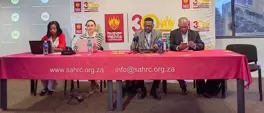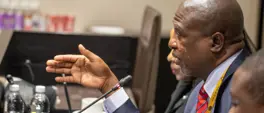LINDA MEYER: Time to rethink NSFAS to ensure future higher education access for all SA students
Linda Meyer
23 April 2024 | 10:30Simply reshuffling personnel without addressing the underlying issues will yield limited results. A complete overhaul of NSFAS is required to address lack of transparency, inadequate systems, and political interference, writes Linda Meyer.
The National Student Financial Aid Scheme (NSFAS) plays a critical role in ensuring access to higher education for hundreds of thousands of South African students. However, it has been limping from one crisis to another for years, leaving students perpetually in the lurch, with some unable to realise their vision for their futures and careers.
As The Independent Institute of Education (IIE), we believe the time has come for a complete overhaul of NSFAS, rather than band-aids being applied whenever yet another problem arises, as was the case again recently with the dissolution of the board.
The IIE recognises the crucial role played by the NSFAS in ensuring equitable access to quality higher education. And while we are a private higher education provider, our commitment to the welfare and access to higher education opportunities for all deserving students in South Africa extends beyond our campuses.
Despite our students not being eligible for NSFAS funding due to the existing policy of only funding public university students, the IIE’s interest lies in the broader goal of empowering as many students as possible, regardless of their financial backgrounds.
It is thus incumbent on us to raise our voice now, regarding the fact that the NSFAS transformation requires more than cosmetic changes. It demands a commitment to transparency, a willingness to confront corruption head-on, and the establishment of robust systems. It is beyond time for all stakeholders to insist on lasting change to ensure equal educational opportunities for all while safeguarding public resources.
Calls for change often focus on replacing the board or management. While leadership accountability is crucial, it is not enough. Simply reshuffling personnel without addressing the underlying issues will yield limited results.
NSFAS' problems are deeply embedded in the organisation's procedures, culture, and perhaps even its informal norms and practices. And so, a complete overhaul is required to address the lack of transparency, inadequate systems, and political interference.
Lack of transparency makes the scheme susceptible to corruption; inadequate and outdated systems are prone to manipulation, and political interference has resulted in kickbacks and favouritism.
NSFAS is a government organisation, and as such, the government should take it over, and funds should be disbursed to the universities where accountability measures are in place.
Universities are already owed in the region of R19.2 billion arising from student debt, yet even after last year's fracas, the same four entities are still dispensing (or indeed not dispensing) funds to students, despite being cancelled at the end of last year.
Stakeholders need to demand accountability and transparency to ensure that the next generation of students has a real chance at accessing quality higher education.
These stakeholders - including educational institutions, government bodies, and civil society - play a pivotal role in shaping the future of higher education. Their actions can significantly impact the accessibility and quality of education for the next generation of students.
Stakeholders must bear responsibility for their decisions and actions. In the context of higher education, it means being answerable for the effectiveness of policies, funding allocation, and programme implementation. When stakeholders demand accountability in the right place, they can ensure that resources are used efficiently, and outcomes align with the intended goals.
It is not too late to ensure that the next generation of students, who deserve a real chance at accessing quality higher education, can do so.
But we are now at the eleventh hour, and the era of quick fixes is well and truly over.
Dr Linda Meyer is MD of The IIE’s Rosebank College, a member of the Higher Education Quality Committee (HEQC) of the Council on Higher Education (CHE), and a board member of the South African Qualifications Authority (SAQA).
Get the whole picture 💡
Take a look at the topic timeline for all related articles.
















